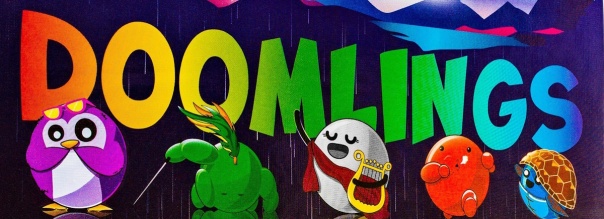Daunted: Battle of Britain
Trevor Benjamin and David Thompson’s Undaunted has grown storied over the past half-decade, crossing the beaches of Normandy, the sands of North Africa, and most recently the besieged city of Stalingrad. That last installment proved one of my favorite light wargame experiences of all time, a grueling and personal perspective on the Second World War’s turning point.
Now the series’ fourth major installment is taking us to the skies. I’m trying to decide whether the letdown it fills me with is thanks to the furious pitch and ambitious quality of Stalingrad or because this system is ill-suited to what Battle of Britain is trying to accomplish.
Fartlings
Sometimes I wonder whether I’ve become a grouchy old man or if some things really are this vacuous. Probably the former.
Doomlings occupies its own corner of the tabletop hobby. It’s a corner I don’t often step into. Boxes covered with cutesy but off-putting caricatures, possibly with foil highlights that glint like neon signs announcing the inclusion of cable TV at that one motel on the edge of town that’s always clashing with the health department. Artwork either drawn by or drawn in imitation of Matthew Inman, the guy who writes The Oatmeal and inflicted Exploding Kittens and its offspring on the world. These are the board games that board game stores are required by law to carry. They sell them to your grandmother when she wanders over, befoiled box in hand, to proudly announce that her grandchildren love board games. This one caught her eye, some part of her mammalian cortex screaming in recognition at the box’s combination of glinting eyes, thirsty smiles, and bulging forms. In caveman times, she would have recognized the signal for alarm, a warning that the creature hunched before her wasn’t quite right, needed to be purged with fire for the good of the tribe. Instead, she will present it to you for your birthday. You will thank her, for you are a good person who loves your grandmother, play it once, and then relegate it to the back of the closet. That’s as close as we get to burning bloodsucking imposters anymore.
It just so happens that Doomlings, designed and illustrated by Justus Meyer rather than Matthew Inman, is possibly the least cynical, or at least the most playable, of that deeply unpleasant category of board game.
Smooth Jazz
Another year, another Bitewing Games crowdfunding campaign. This time around, there are three titles on offer, unified by a jazzy setting that may or may not come through in print. Rather than drag this out into an entire festival, today we’re hosting a three-part set that will emphasize the highs and lows of all three pieces.
Spoiler: One of them is amazing.
Who’s Your Daddy?
Blood on the Clocktower is special. That’s always been apparent. Steven Medway not only succeeded in making a better social deduction game, he set a benchmark that might not be surpassed anytime soon.
But while I’ve enjoyed my time with Blood on the Clocktower, it wasn’t until I was invited to a session with a local gay gaming group that its true power became apparent.
Goofy Little Hamburgers
I’m suspicious of anything marketed as a “coffee table game.” For one thing, I belong to the generation that according to newspaper op-eds has ruined everything good in western society, coffee tables included. For another, why should I take a chance on an unknown title for ornamenting my home when I could just put out a nice chess set, go board, or most handsome of all, a crokinole round? Less talking, more flicking.
Qawale, designed by Romain Froger and Didier Lenain-Bragard, was explicitly pitched to me as a coffee table game. To my uncultured eye, it bears closer resemblance to a bunch of goofy little hamburgers on a griddle.
Violent Zornography
Talk about pedigree. The Struggle for Zorn: The Red Blight is a mouthful in more ways than one. Take its trio of designers: Hermann Luttmann, the creator behind Dawn of the Zeds and The Plum Island Horror, Fred Manzo of Escape from Hades, and Ryan Heilman, whose Brave Little Belgium took a big risk by centering wartime atrocities. Zorn is a three-way baby that bears strands of DNA from each of them. It’s big, long, messy, overcomplicated, and enthralling.
Don’t Play with Matches
I want to state this first, for the record: the container for Matches, the trick-taking-ish game by Daniel McKinley, is maybe my favorite board game box in recent memory. It slides open like an actual box of matches! Its color palette is dingy and slightly burned! The sides are embossed to look and feel like striker strips! Ten out of ten. Yeoman’s work.
If only the game within the box had been better.
Return to Return to Dark Tower
I’m wary of expansions. Doubly so when it comes to expansions for adventure games. Back in its heyday, Fantasy Flight Games couldn’t resist the temptation to overload any successful title with additional cruft. New decks, new characters, new sideboards. Shudder. So many sideboards. After a couple expansions, setup became so daunting that it was easier to leave it all in the closet.
So when Alliances and Covenant, the first two expansions for Return to Dark Tower, showed up on my doorstep, I was both excited and apprehensive. No small measure of the original remake’s appeal was its dedication to a streamlined experience. Would the addition of new stuff be the accidental conclusion of my love affair with Return to Dark Tower?
I shouldn’t have worried. As usual, the crew at Restoration Games has a preternatural understanding of what makes games tick. What follows are three ways that these expansions, in particular Covenant, get it right.
Dungeon Accountant
Remember Dungeon Keeper? I was only a kid when I played it off of a PC Gamer demo disc, just a little older than my daughter is now. At that age, playing as the baddie was transgressive, a dark secret I never could have shared with my parents. Looking back, they probably would have laughed. Or asked whether it was satanic. It’s hard to know which phase we were in at the time.
Jordy Adan’s Stonespine Architects is set in the same shared universe as Roll Player, Dawn of Ulos, and his own Cartographers. It’s about building a dungeon, carved in stone and filled with deadly traps and monsters. Like the other titles in the Roll Player line — and very much unlike Dungeon Keeper to an eleven-year-old — it’s a safe and colorful place, inoffensive, and certainly absent any form-fitting black leather. As drafting and tile-laying games go, it’s pretty good.
The Galaxy Is on Orion’s Belt
Orion Duel is the sort of game fifth-dimensional beings play while waiting for the next Big Crunch to reset the universe. Designed by Alberto Branciari and Andrea Mainini, this is an abstract that nominally resembles John Nash’s classic game Hex, but with a few major wrinkles thrown in for good measure. I am very bad at it.









